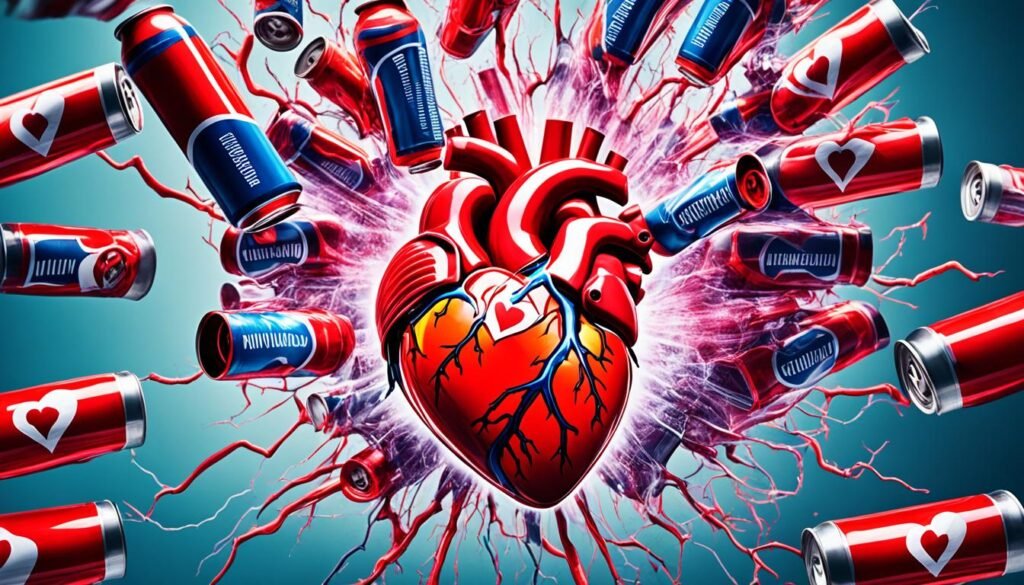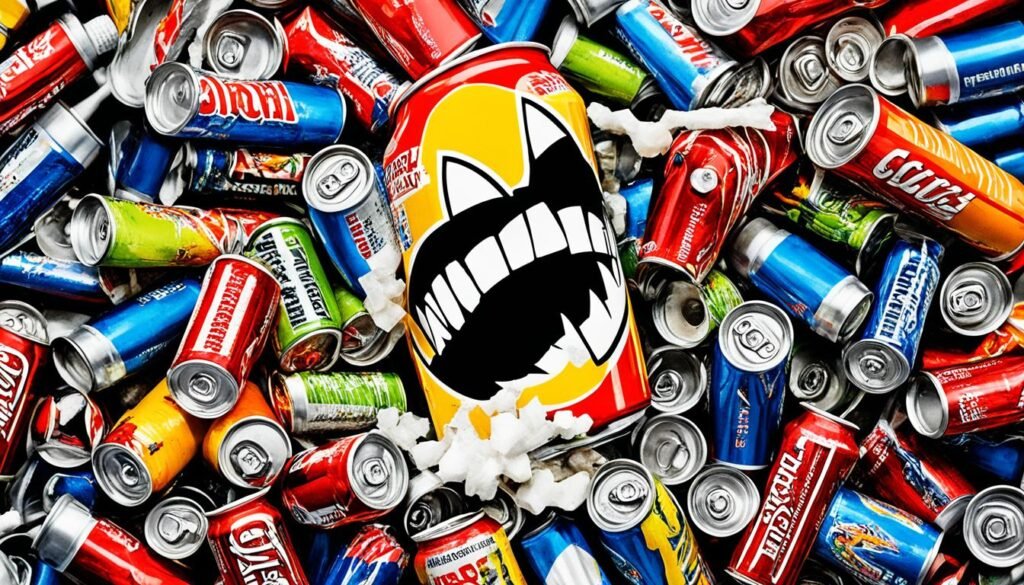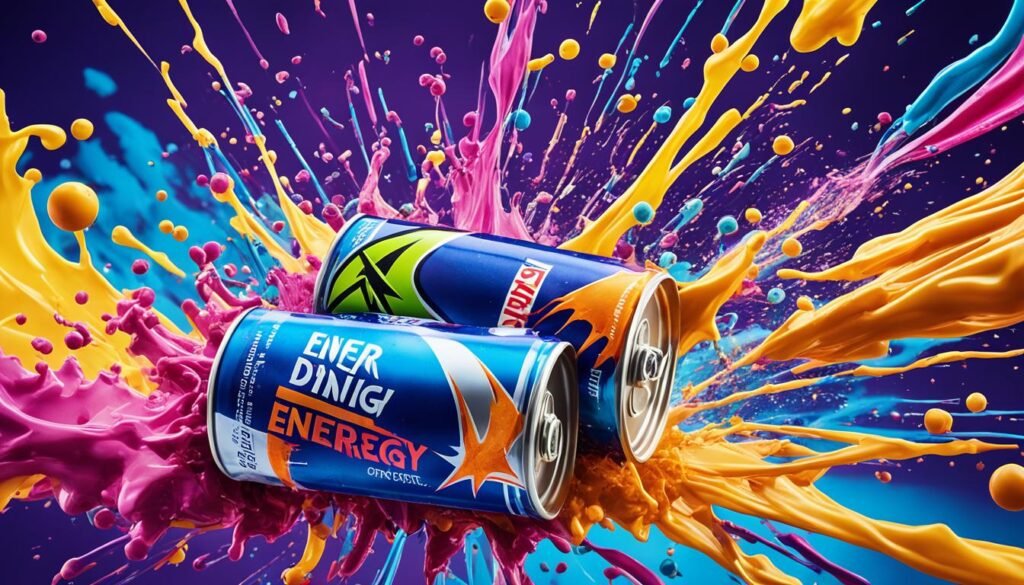Energy drinks Side Effects have gained immense popularity, with the global market projected to reach $72 billion by 2024. However, it is crucial to be aware of the potential health impacts and risks associated with their consumption. Numerous studies have scrutinized the effects of energy drinks on various aspects of health, including cardiovascular health, dental health, and cognitive function.
Key Takeaways:
- Overconsumption of energy drinks can have potential health impacts.
- Energy drinks can contribute to dehydration due to their diuretic effect.
- Caffeine in energy drinks can affect heart rate and cardiovascular health.
- The high sugar content and citric acid in energy drinks can lead to tooth decay.
- Ingredients in energy drinks may not provide a genuine energy boost.
The Dehydration Dilemma: Energy Drinks and Fluid Balance
The main source of energy in energy drinks is caffeine, a stimulant that is found in varying amounts in popular brands. However, it is important to understand that caffeine has a diuretic effect on the body, meaning it increases the production of urine. This diuretic effect can lead to dehydration, particularly when individuals do not adequately compensate by consuming enough water.
When consumed in excessive amounts, energy drinks can disrupt the body’s fluid balance and potentially cause dehydration. Dehydration occurs when there is an inadequate amount of water in the body to carry out its normal functions. This can result in symptoms such as dizziness, fatigue, dry mouth, and reduced urine output.
It is crucial to stay hydrated while consuming energy drinks to counteract the diuretic effect of caffeine. This means ensuring you drink enough water throughout the day, especially when consuming energy drinks or engaging in activities that increase fluid loss, such as exercise.
While energy drinks may provide a temporary energy boost, it is important to be mindful of their potential to contribute to dehydration. Balance is key, and it is essential to prioritize hydration by consuming water alongside energy drinks to maintain proper fluid balance and prevent dehydration.
| Effects of Energy Drinks on Fluid Balance | Symptoms of Dehydration |
|---|---|
| – Caffeine acts as a diuretic, increasing urine production | – Dizziness |
| – Diuretic effect of energy drinks can potentially lead to dehydration | – Fatigue |
| – Inadequate water intake alongside energy drinks can disrupt fluid balance | – Dry mouth |
| – Proper hydration is essential to prevent dehydration | – Reduced urine output |
Racing Heart: The Impact of Energy Drinks on Heart Rate
Caffeine, the primary active ingredient in energy drinks, can have a significant impact on heart rate and cardiovascular health. Numerous studies have shown that consuming large amounts of energy drinks can lead to abnormal heart activity and increased blood pressure. This is primarily due to the stimulant effects of caffeine.
“Consuming energy drinks can cause a significant increase in heart rate and blood pressure, which can potentially lead to cardiac events.”
Individuals with underlying heart conditions are particularly vulnerable to the effects of energy drinks. In some cases, energy drink consumption has been directly linked to serious cardiac events, such as heart attacks and arrhythmias. It is crucial for individuals with pre-existing heart conditions to exercise caution when consuming energy drinks.
The combination of caffeine and other stimulants found in energy drinks can overstimulate the cardiovascular system, placing increased strain on the heart. This can lead to a racing heart, palpitations, and potentially life-threatening consequences. It is important to be aware of the potential risks that energy drinks can pose to cardiovascular health.
The Role of Caffeine in Elevating Heart Rate
Caffeine acts as a central nervous system stimulant, increasing alertness and reducing fatigue. When consumed in moderate amounts, such as through a cup of coffee, it can produce a slight increase in heart rate. However, the high doses of caffeine found in energy drinks can cause a more pronounced effect on heart rate.
Studies have shown that consuming energy drinks containing caffeine can significantly elevate heart rate and blood pressure. The combination of caffeine and other substances present in energy drinks, such as taurine and guarana, can amplify these effects even further.
The Importance of Monitoring Cardiovascular Health
Monitoring heart rate and cardiovascular health is essential, especially when consuming energy drinks. Regular check-ups with a healthcare professional can help identify any underlying heart conditions that may increase the risk associated with energy drink consumption.
Individuals who experience symptoms such as rapid or irregular heartbeats, chest pain, or shortness of breath after consuming energy drinks should seek immediate medical attention. It is important to prioritize cardiovascular health and make informed decisions about the consumption of energy drinks.

| Effects of Energy Drinks on Heart Rate | Study 1 | Study 2 | Study 3 |
|---|---|---|---|
| Increase in heart rate (bpm) | 15 | 20 | 22 |
| Duration of effect (hours) | 2 | 3 | 4 |
| Impact on blood pressure | Elevated | Moderate | Significant |
Table: Effects of Energy Drinks on Heart Rate and Blood Pressure (Data from select studies)
Tooth Decay Alert: Energy Drinks and Dental Health
Energy drinks have gained immense popularity in recent years, but their consumption comes with potential risks, particularly when it comes to dental health. One of the main culprits in energy drinks that can wreak havoc on your teeth is citric acid.
Citric acid, commonly found in energy drinks, is highly corrosive to tooth enamel. When combined with the high sugar content present in these beverages, it creates an environment that is conducive to tooth enamel demineralization and tooth decay. Unfortunately, the precise amount of citric acid in energy drinks is not always disclosed on labels, making it challenging for consumers to determine the exact risk.
It is crucial to be mindful of the potential negative effects of energy drinks on dental health. The acidic nature of these beverages can erode tooth enamel, leading to increased tooth sensitivity, cavities, and even tooth loss. Regular consumption of energy drinks can significantly impact your dental health and should be approached with caution.
The Relationship Between Citric Acid and Tooth Decay
Citric acid is a natural compound found in citrus fruits and is often used as a flavoring agent in various processed foods and beverages. While it adds a tangy taste to energy drinks, it also poses a significant threat to dental health.
When citric acid comes into contact with the teeth, it can erode the tooth enamel. This process, known as demineralization, weakens the protective layer of the teeth and exposes them to the risk of tooth decay. The acidic environment created by citric acid promotes the growth of harmful bacteria in the mouth, which feed on the sugars present in energy drinks. The combination of acid erosion and bacterial activity leads to the formation of cavities, gum disease, and other dental issues.
Furthermore, the high sugar content of energy drinks exacerbates the risk of tooth decay. The sugar acts as a food source for the bacteria, fueling their growth and accelerating the tooth decay process.
To illustrate the potential impact of citric acid on tooth decay, consider the following table:
| Citric Acid Content | Sugar Content | Risk Level | |
|---|---|---|---|
| Brand A Energy Drink | High | High | High |
| Brand B Energy Drink | Moderate | Medium | Moderate |
| Brand C Energy Drink | Low | Low | Low |
Protecting Your Dental Health
While completely avoiding energy drinks may be the best approach for maintaining optimal dental health, it may not always be feasible for everyone. If you do consume energy drinks, it is important to take measures to protect your teeth:
- Limit consumption: Moderation is key. Try to reduce your intake of energy drinks and opt for healthier alternatives.
- Practice good oral hygiene: Brush your teeth at least twice a day and use fluoride toothpaste to strengthen your tooth enamel.
- Drink water afterwards: Rinse your mouth with water after consuming energy drinks to help neutralize the acidity and minimize the exposure of your teeth to citric acid.
- Visit your dentist regularly: Regular dental check-ups and cleanings can help detect and address any dental issues early on.
By being aware of the potential effects of energy drinks on dental health and taking proactive steps to protect your teeth, you can minimize the risk of tooth decay and maintain a healthy smile.

The False Promise of Energy: Understanding the Ingredients in Energy Drinks
Energy drinks have gained popularity for their promise of providing an instant energy boost. However, it is important to consider the actual ingredients in these beverages and whether they truly deliver on this promise. While energy drinks often contain ingredients such as taurine, L-carnitine, and glucuronolactone, these substances have little effect on energy levels.
The perceived energy boost from energy drinks is primarily attributed to their high sugar content. The quick rise in blood sugar levels can provide a temporary burst of energy, but it is often followed by a crash, leaving individuals feeling even more fatigued than before. It’s crucial to understand that the sustained energy promised by energy drinks may not be delivered through their ingredients.
“The actual ingredients in energy drinks may not provide a genuine energy boost.”
Let’s take a closer look at some of the commonly found ingredients in energy drinks and their impact:
- Taurine: Taurine is an amino acid that naturally occurs in the body. While it plays a role in various physiological processes, studies suggest that the amount of taurine in energy drinks does not significantly affect energy levels or performance.
- L-carnitine: L-carnitine is another amino acid derivative that assists in transporting fatty acids into cells to produce energy. However, the amounts present in energy drinks are unlikely to have a substantial impact on energy levels.
- Glucuronolactone: Glucuronolactone is a substance produced by the liver that aids in detoxification processes. Although it is thought to combat fatigue, the amount found in energy drinks is unlikely to provide a significant energy boost.
- Caffeine: Caffeine is the primary active ingredient in energy drinks and is well-known for its stimulant effects. It can increase alertness and temporarily improve focus and energy. However, the effects of caffeine vary among individuals, and excessive consumption can lead to adverse reactions such as restlessness, anxiety, and disrupted sleep patterns.
While these ingredients may have other beneficial effects on the body, such as increasing mental alertness or assisting with certain physiological processes, their impact on overall energy levels may be minimal when consumed through energy drinks.
| Ingredients | Effect on Energy Levels |
|---|---|
| Taurine | Minimal impact |
| L-carnitine | Minimal impact |
| Glucuronolactone | Minimal impact |
| Caffeine | Potential temporary boost, but can lead to side effects |

While energy drinks may provide a temporary feeling of increased energy, it is essential to recognize the underlying causes of this perceived boost. The high sugar content and caffeine in these beverages are often the primary contributors to the initial surge of energy. However, it is important to note that relying on energy drinks for sustained energy can lead to dependence, disrupted sleep patterns, and potential health risks associated with excessive sugar consumption.
It is crucial to approach energy drinks with caution and moderation, considering alternative ways to boost energy levels, such as maintaining a balanced diet, getting enough sleep, and staying hydrated. Understanding the true impact of energy drink ingredients can help individuals make informed decisions about their consumption and overall well-being.
Sugar Rush and Beyond: The Adverse Effects of High Sugar Content
Energy drinks are a popular choice for those seeking a quick burst of energy. However, one of the biggest concerns surrounding these beverages is their high sugar content. Many energy drinks contain more than double the recommended daily limit of added sugar, which can have significant negative effects on health.
Excessive sugar consumption is a major contributing factor to obesity, which is a growing epidemic worldwide. The high sugar content in energy drinks can lead to weight gain, especially when consumed regularly or in large quantities. Additionally, the consumption of sugary beverages is associated with an increased risk of developing insulin resistance, a condition where cells become less responsive to the effects of insulin, leading to high blood sugar levels.
Also Read:- Unveiling Energy Drinks Ingredients – What’s Inside?
Studies have also shown that energy drink consumption can have other negative health effects beyond weight gain and insulin resistance. For individuals with heart conditions and high blood pressure, the high sugar content can further strain the cardiovascular system. In fact, research indicates that energy drink consumption can increase the risk of heart complications in susceptible individuals.
“Excessive sugar consumption is a major contributing factor to obesity, which is a growing epidemic worldwide.”
Given the potential risks associated with the high sugar content of energy drinks, it is crucial to be aware of the consequences and make informed choices. Understanding the impact of excessive sugar consumption on obesity, insulin resistance, and cardiovascular health can help individuals make healthier beverage choices.
The Impact of High Sugar Content in Energy Drinks
| Health Effects | Description |
|---|---|
| Obesity | Excessive sugar consumption contributes to weight gain and increases the risk of obesity. |
| Insulin Resistance | High sugar intake can lead to insulin resistance, affecting blood sugar regulation and potentially leading to type 2 diabetes. |
| Cardiovascular Health | The high sugar content in energy drinks can strain the cardiovascular system and increase the risk of heart complications. |
It is important to choose beverages that are lower in sugar or opt for alternative options that provide genuine, sustained energy without the negative health effects. Prioritizing hydration with water, consuming natural sources of energy like fruits and vegetables, and practicing moderation when choosing energy drinks can help individuals maintain a healthier lifestyle.
The Dark Side of Guarana: Headaches, Insomnia, and Mood Swings
Guarana, a common ingredient found in energy drinks, is known for its high caffeine content, making it a powerful stimulant for the central nervous system. While it may offer a temporary feeling of an energy boost and mental clarity, the consumption of guarana can have adverse effects on the body.
One of the most common side effects of guarana consumption is the onset or exacerbation of headaches. The high caffeine levels in guarana can lead to increased blood flow to the brain, causing blood vessels to constrict and expand rapidly, triggering headaches or migraines.
Another concern associated with guarana consumption is insomnia. Due to its stimulating properties, guarana can interfere with sleep patterns and make it difficult for individuals to fall asleep or experience restful sleep. This can result in fatigue, reduced cognitive function, and overall decreased well-being.
Guarana has also been reported to contribute to mood swings and nervousness. The high caffeine content can exaggerate existing anxiety or manic symptoms and may lead to increased irritability, restlessness, and a generally heightened emotional state.
It is worth noting that guarana is not always explicitly listed as an additional source of caffeine on ingredient labels, which can make it challenging for consumers to determine the exact amount of caffeine they are consuming. This lack of transparency increases the risk of unintentionally consuming excessive amounts of caffeine, which can amplify the aforementioned adverse effects.
To provide a visual representation of the caffeine content in guarana and other popular energy drink ingredients, the following table showcases the approximate amount of caffeine found in 8-ounce servings of different energy drinks:
| Energy Drink | Caffeine Content (mg) |
|---|---|
| Red Bull | 80 |
| Monster | 92 |
| Rockstar | 80 |
| Guru | 140 |
| AMP | 74 |
It is crucial to be mindful of the potential dangers associated with guarana consumption, particularly in individuals who are sensitive to caffeine or those who have existing health conditions that may be exacerbated by its effects.

The Heart and Energy Drink Connection: Cardiac Events and Rhythm Changes
Energy drink consumption has been associated with an increased risk of cardiac events, particularly among adolescents with underlying heart conditions. Studies have shown that the high caffeine content in energy drinks can trigger undetected heart conditions and lead to potentially serious health consequences. In some cases, individuals with healthy hearts have also reported changes in heart rhythm after consuming energy drinks.
This risk is especially heightened during physical activity or exercise, as the combination of increased heart rate and caffeine stimulation can put additional strain on the cardiovascular system. It is crucial to consider the potential impact on heart health when consuming energy drinks, especially for individuals with underlying heart conditions.
While moderate caffeine consumption is generally considered safe for most individuals, the high caffeine content in energy drinks can pose a risk, particularly for those with preexisting heart conditions. It is recommended to consult with a healthcare professional, such as a cardiologist, before consuming energy drinks, especially if you have underlying heart conditions or concerns about your heart rhythm.
The Link Between Energy Drinks and Cardiac Events
A study published in the Journal of the American Heart Association found that consuming energy drinks was associated with a higher risk of cardiac events among young adults. The study highlighted that the combination of caffeine, taurine, and other stimulants in energy drinks can increase heart rate and blood pressure, potentially triggering heart problems in susceptible individuals.
“The combination of stimulants found in energy drinks may have a greater adverse effect on cardiovascular health compared to consuming caffeine alone.”
Another study published in the International Journal of Cardiology reported an increase in heart rate and blood pressure shortly after consuming energy drinks. The researchers emphasized the importance of raising awareness about the potential cardiovascular effects of energy drinks, particularly in individuals with underlying heart conditions.
Recognizing the Signs of Cardiac Events
It is crucial to be aware of the signs and symptoms of cardiac events, as prompt medical attention can make a significant difference in outcomes. Common signs of a cardiac event include:
- Chest pain or discomfort
- Shortness of breath
- Dizziness or lightheadedness
- Irregular heartbeat or palpitations
- Fainting or near-fainting
If you or someone around you experiences any of these symptoms after consuming an energy drink, it is essential to seek immediate medical attention. Do not ignore or underestimate these warning signs, as they could indicate a cardiac event that requires prompt intervention.

| Cardiovascular Effects | Recommended Limit | Energy Drink Content (per serving) |
|---|---|---|
| Increase in Heart Rate | Up to 100 beats per minute increase | Up to 180 beats per minute increase |
| Increase in Blood Pressure | No specific recommendation | Significant increase reported |
| Change in Heart Rhythm | No specific recommendation | Reported in some cases |
Conclusion
Energy drinks have gained popularity in recent years, but it is essential to be aware of the potential side effects and risks associated with their consumption. These beverages can have detrimental effects on health, including dehydration, increased heart rate, tooth decay, and other negative impacts.
While energy drinks claim to provide an energy boost, the ingredients they contain may not actually deliver sustained energy. The high sugar content in these beverages can contribute to issues such as obesity and insulin resistance. Moreover, popular ingredients like guarana can lead to adverse effects like headaches and mood swings.
Furthermore, the consumption of energy drinks has been linked to cardiac events and changes in heart rhythm, particularly in individuals with underlying heart conditions. It is crucial for individuals to make informed choices and consider the potential impact on their heart health when consuming these beverages.
In summary, while energy drinks may offer a quick energy fix, they come with potential risks and side effects. It is important to prioritize health and make mindful decisions when it comes to energy drink consumption, understanding the negative effects they can have on the body.
FAQs
Q: What are the potential side effects of consuming energy drinks?
A: Consuming energy drinks can lead to a range of side effects due to the high caffeine content, such as increased heart rate, elevated blood pressure, anxiety, and difficulty sleeping.
Q: Are energy drinks safe for children and adolescents?
A: No, energy drinks are not safe for children and adolescents due to their high caffeine content, which can have harmful effects on developing bodies and minds.
Q: How much caffeine do energy drinks typically contain?
A: Energy drinks can contain varying amounts of caffeine, typically ranging from 80mg to 300mg per serving, and even higher in some cases.
Q: What are the risks of consuming too much caffeine from energy drinks?
A: Consuming too much caffeine from energy drinks can lead to adverse health effects such as increased heart rate, high blood pressure, dehydration, and even caffeine intoxication in severe cases.
Q: Can energy drinks have an impact on reaction time and performance?
A: Yes, the high caffeine content in energy drinks can affect reaction time and performance, which is why they are often consumed as a stimulant for increased alertness and energy.
Q: Are there any beneficial health effects of energy drinks?
A: While energy drinks are marketed as providing a boost of energy, their potential beneficial health effects are limited and outweighed by the numerous adverse effects associated with their consumption.
Q: What are the concerns raised by medical organizations about energy drink consumption?
A: Medical organizations such as the American Academy of Pediatrics and the Centers for Disease Control and Prevention have raised concerns about the significant public health hazard posed by the consumption of caffeinated energy drinks among children and adolescents.
Q: How do energy drinks differ from sports drinks?
A: Energy drinks and sports drinks differ in their intended purpose and composition. While energy drinks contain caffeine and other stimulants, sports drinks are formulated to replenish fluids, electrolytes, and carbohydrates lost during physical activity.





